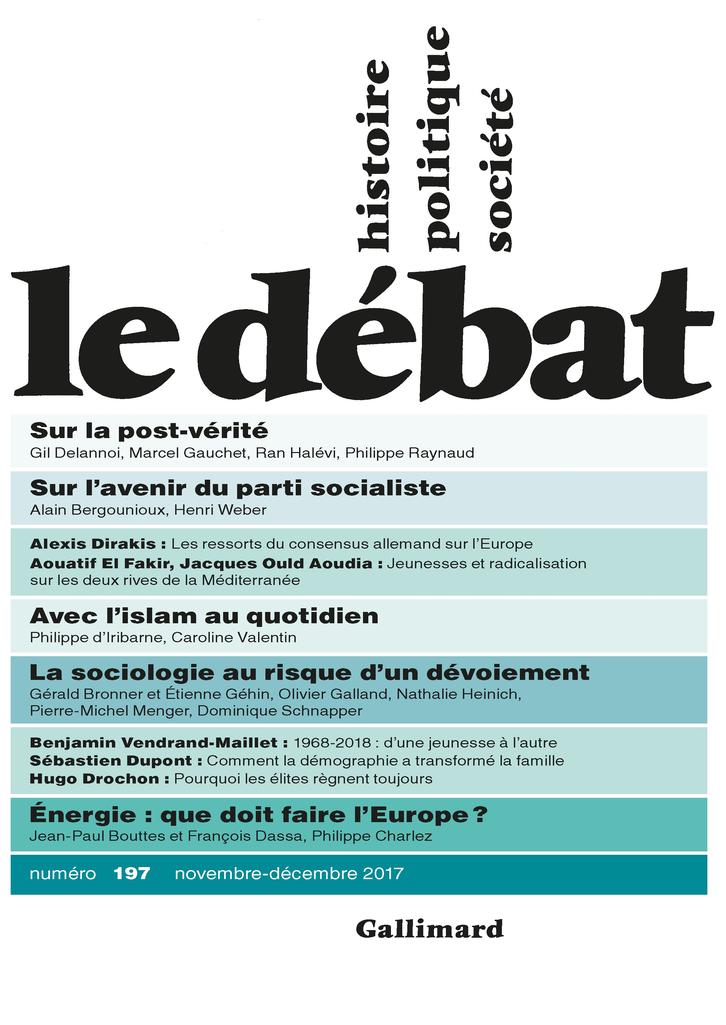Are people with Muslim first names discriminated against in hiring, and why?
Listen A study, published in March 2010, by the French-American foundation (1), examines the problem of discrimination in hiring that exists in France vis-à-vis people with a first name Muslim. This study, carried out by Claire Adida and David Laitin, from Stanford University, and Marie-Anne Valfort, from the Sorbonne, consisted of researching whether the discrimination in hiring noted in previous studies (2) at the he regard for French people of North African origin was due to their North African origin (a sort of anti-North African racism), or to the fact that the candidates for employment were of the Muslim religion.
The methodology of the study was that of testing the CVs of fictitious job candidates.
Three CVs have been created: The first CV is that of a “reference” candidate with a typically French first and last name: Aurélie Ménard. The other two CVs concern candidates with the same typically Senegalese surname (Diouf) but different first names: one has a “typically Muslim” first name (Khadija) while the other has a “typically Catholic” first name (Marie ). In addition to the first name, two additional signals of denominational affiliation related to work, voluntary or not, for religious organizations have been introduced. Thus, one can read in Khadija's CV that she worked for some time at Secours Islamique and as a volunteer for the Muslim Scouts of France, and in Marie's CV that she worked for some time at Secours Catholique and in as a volunteer with the Scouts and Guides of France (Aurélie has not been employed, as an employee or volunteer, by any organization linked to a religion).
The other characteristics of the three candidates are identical: they are single, aged 24, of French nationality, inhabitants of socio-economically equivalent neighborhoods, with a BTS in the field of secretarial-assistant management or accounting assistant, and three years of professional experience in the same field.
The jobs applied for by these fictitious candidates were positions likely to involve contact with the company's customers or partners.
In some companies, the CVs of Aurélie Ménard and Marie Diouf were sent simultaneously, in others, the CVs of Aurélie Ménard and Khadija Diouf (the CVs of Marie Diouf and Khadija were never sent simultaneously in the same company). Diouf, because it could have seemed strange to the recruiter and aroused his mistrust).
In the 138 companies where the first pair of CVs were sent, there was no statistically significant difference between the positive responses (candidate's invitation by the employer) between Aurélie Ménard (27% invitation) and Marie Diouf (21% call) while in the 138 companies where the second pair had been sent, there was a highly significant difference between Aurélie Ménard's 25% call and Khadija Diouf's 8% call.
The authors conclude: "This CV test reveals that Muslims are 2.5 times less likely to get a job interview than their Christian counterparts. A survey also shows that Muslims have a monthly income lower by 400 euros on average than that of Christians. This difference in income may be explained in part by the discrimination in hiring suffered by Muslims. "
The authors conclude: "Our results therefore highlight a disturbing reality: in the theoretically secular French Republic, Muslim citizens of immigrant background encounter, all other things being equal, obstacles to integration through access to far higher employment than their Christian counterparts.”
What do you think of this study and its conclusions?
1°) Despite its seemingly rigorous methodology, its conclusions are not quite as certain as the authors think.
Indeed, one could just as easily imagine that it is not the Muslim first name that is discriminated against, but the foreign first name. To be really conclusive, the study should have compared, by the same method of testing the CVs of fictitious candidates, a so-called "native" Frenchman with two job candidates from a population that is not very subject to discrimination (for example the French having a Polish surname), one having a French first name and the other with a Polish first name. One could, for example, compare a "Julien Lefebvre" with a "François Polonowski" and a "Bromislaw Polonowski" (or a "Zbigniew Polonowski", as you wish).
It is quite possible that Bromislaw or Zbigniew Polonowski would get a lot fewer job interviews than François Polonowski. In which case the argument that it is the Muslim religion that causes discrimination would fall apart. It is perhaps simply the foreign character of the first name that is in question.

2°) This study also shows a pleasing observation: discrimination in hiring linked to the simple fact of having black skin has practically disappeared: in fact, Marie Diouf (surname almost exclusively borne by people with black skin) had as much luck in this study to obtain a job interview as Aurélie Ménard. This dispels the idea that the French people are generally a racist people. That may have been the case in the past, that is no longer true, and that is to be welcomed.
3°) This study confirms an impression that everyone has: each society has its signs of recognition, and in France, the first name has an absolutely fundamental value as a social marker. It is quite possible that, for a job offer as a senior executive in a large company, with a rigorously equivalent CV, applicants with first names evoking the working class, such as Kevin or Océane, have less chance of obtaining the position than applicants with upper middle class first names such as Charles-Henri or Anne-Sophie. It is not even excluded that we observe in these cases the same difference in invitation to a job interview as between Aurélie Ménard and Khadija Diouf.
One thing seems certain: to be recognized by everyone as a Frenchman, it is much better to have a French first name: no one will doubt that François Polonowski is French, on the other hand everyone will think a priori that Zbigniew Polonowski is Polish, even if in he was born in France and of French nationality.
4°) Assuming, which is not formally proven by the study, that it is not the foreign first name that is discriminated against, but the Muslim first name, the reason for this remains to be imagined. To do this, you just have to put yourself in the shoes of the employer, one of whose main fears is to find yourself confronted with a union action, or worse, to go to the industrial tribunal for an employer-employee dispute.
Employers therefore abhor anything that may seem like an uncertainty or a source of trouble.
- Faced with a CV with a foreign first name, an employer will wonder if the candidate speaks French well enough to understand the clients or be understood by them.
- In front of a CV with a Muslim first name, the employer will already have the same mistrust as in front of a foreign first name. It is unlikely that in the future first names like Khadija or Mohamed will be considered by the majority of French people as French first names and not as Arabic first names. Realistically, it will take at least ten generations for such a thing to happen, if it is possible. So, when he sees the CV, he inevitably asks himself the fateful question: "he is a foreigner, does he speak correct French?", even if the foreigner in question was born in France and of French nationality , as well as his parents.
Furthermore, faced with a Muslim first name, the employer finds himself confronted with the possibility of problems that have already occurred in other companies and will therefore ask himself several questions:
- Will this candidate, who arrives unveiled at the job interview, start veiling at the end of the trial period or after a wedding, which would force the employer to dismiss her? Employers generally want to give a modern and dynamic image to their company, so they do not appreciate that employees ostensibly display, by wearing the veil, a bigotry of the Middle Ages. We can say that the more an employer sees veiled Muslim women in the street, the less inclined he will be to hire a Muslim woman, even presenting herself unveiled, given the risk of having to face, later, a veil problem on the workplace.
- Will this candidate be unable to work effectively in the afternoon one month a year because it is Ramadan?
- Will this candidate involve the union so that the canteen offers pork-free meals or halal meats?
- Will this candidate ask for a prayer room and stop working five times a day to pray, and ask for different days off for religious reasons?
All these risks of religious conflicts have already materialized in many companies, and constitute a real deterrent for employers, who are aware of the possibility of this type of problem.
To this problem of discrimination which seems to be the victim of people with a Muslim first name (many of whom are moreover not at all of the Muslim religion), we can propose two types of solutions:
1°) The so-called "politically correct" solution:
It would consist, using ethnic statistics, in determining the proportion of "Muslim" first names in the French population and then passing a law saying that, if this proportion is, for example, 1 in 20, the companies will be prosecuted for discrimination if the proportion of employees with Muslim first names is, for example, less than half of this rate. To this quota policy could be added another possibility, which would also be to carry out tests on fictitious CVs.
This solution that some would dream of is totally inapplicable for many reasons:
- it is against the Constitution, which prohibits ethnic statistics, all citizens being equal before the law,
- it would in practice be inapplicable in most small and medium-sized enterprises (3) . Indeed, 92% of French companies have a workforce of less than 10 employees, and 97% a workforce of less than 250 employees. For companies with less than 40 employees, the absence of an employee with a Muslim first name could be due to the simple chance of statistics as much as to supposed discrimination. Moreover, most employers of very small companies do not call on the ANPE for their recruitment, but are content to select, when they need staff, the unsolicited applications they receive in large quantities all the time. year, even when they did not publish any job offers. Testing on fictitious CVs is ineffective in this case, since it can only work in relation to an existing and published job offer.
- This politically correct solution would require the creation of a bureaucratic body of first name inspectors, whose stupid task would be to tally up Muslim first names in companies, against the total number of employees.
- it could, in some cases, discriminate negatively against non-Muslim candidates,
- it is globally inapplicable, draconian and big-Brotherian!
2°) The "politically incorrect", realistic or assimilationist solution:
It consists in recommending a realistic individual solution and not a state solution. Each person who leaves their country of origin to arrive in France (or elsewhere) finds themselves subject to a confrontation between the pleasure principle and the reality principle. The pleasure principle consists in imagining that when arriving in France, one can continue to live with non-French customs, without learning French, or even reconstituting a foreign micro-society in France. The principle of reality consists in telling oneself that, in France, if one wants to end up being considered as French, one must do as the French do, speak French as much as possible, respect French customs, give French first names to his children (because, since the ordinance of Villers-Cotterets enacted by François Premier, the official language of France is French) and to abandon all the characteristics of his culture of origin which are not compatible with the mode of life, legislation or mores in France.
This solution therefore consists in avoiding self-discrimination, and therefore, rather than waiting ten generations or an eternity for all French people to consider first names such as Mohamed or Khadija as French first names, to do the extremely simple effort of giving her children French first names rather than Muslim first names (which are actually first names in the Arabic language). This is made all the easier for Muslim citizens as, when reading the Koran, there is no instruction in this book as to the first names to be given to children. This is also confirmed when we observe, for example, the first names given in Turkey ( 4) (5 ): if some Turks have Muslim first names such as Mehmet (Turkish version of Mohamed ) or Abdullah, most have first names which have absolutely nothing to do with the Muslim religion, but rather with poetic or other words. This in no way prevents them from being, for the majority of them, of the Muslim religion.
A second aspect of this individual solution consists, for French people of the Muslim faith, in admitting that companies have nothing to do with places of worship or religious proselytism: people do not pray there, they eat in the company canteen what there is to eat without being difficult or else you eat elsewhere, you do not display your religion (nor your political opinions) there by your dress; if you think you have to do Ramadan, you choose your month of paid leave during the month of Ramadan, so as not to penalize the company by a significant drop in work performance caused by fasting.
A third part of this assimilationist solution would be to authorize entrepreneurs to include, in the internal regulations of their company, the obligation of religious neutrality of employees and secularism in the workplace, as this obligation already exists in schools and public services. It's a safe bet that an employer would hire a woman with a Muslim first name much more easily if he could enact internal regulations prohibiting religious symbols, clothing or other, inside his company. A woman who starts wearing the veil after her trial period could in this case be dismissed without any problem for not respecting the internal regulations.
A final aspect of this assimilation process would be to facilitate, for anyone with a foreign first name, the adoption of a French first name in addition to their original first name, or the Frenchization of their foreign first name (approach which is currently quite long, complicated, expensive, and of uncertain result, whereas it should be a simple and free administrative act. )
There is no doubt that with the adoption of this common sense solution, Marie Ben Ali, like Marie Diouf, will find work as easily as Aurélie Ménard, and that no one will know if Marie Ben Ali is Muslim , Catholic or atheist, she will simply be considered by all her compatriots as a Frenchwoman and it will be much better that way...
Docdory
(1) http://immigration.blogs.liberation.fr/files/étude.pdf
(2) Duguet, Emmanuel, Noam Leandri, Yannick L’Horty and Pascale Petit (2008). “Are Young
French Jobseekers of Ethnic Immigrant Origin Discriminated Against? A-Controlled
Experiment in the Paris Area”, Working Paper.
(2) http://www.observatoiredesdiscriminations.fr/images/stories/presentation_du_testing_mai2004.pdf?phpMyAdmin=6e32dcee8760039a64c94b6379294e26
(2) http://www.travail-solidarite.gouv.fr/IMG/pdf/2008.02-06.3.pdf
(3) http://en.wikipedia.org/wiki/Small_and_medium_businesses
(4) http://pagesperso-orange.fr/gontier.michel/prenoms.htm
(5) http://en.wikipedia.org/wiki/List_of_préTurkish_names








